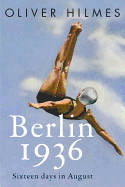
Oliver Hilmes's Berlin 1936, translated from the German by Jefferson Chase, brings to mind Erik Larson in the way it resuscitates famous figures from history alongside forgotten contemporaries. Focusing on the 16 days of the 1936 Olympics, held in Berlin, Hilmes has managed a deft re-creation of a city caught between the opulent, transgressive splendor of its past and the iron grip of Nazism. Various entertainers, club owners, Olympic athletes and even American novelist Thomas Wolfe feature in the book as they try to find their footing in an uncertain new world.
Berlin 1936 has its strongest modern resonances in the way the Nazi regime uses the games as a massive propaganda campaign. Hilmes highlights official missives encouraging the media to tamp down their usual output of nationalism and race-baiting in order to present a sanitized version of Nazi Germany. Many visitors were successfully persuaded by the regime's benign self-representation even as concentration camps were being filled and Hitler was fanning the flames of war in Spain.
Against this backdrop, the two weeks Hilmes describes seem almost surreal. An American woman launches a "kiss attack" on Adolf Hitler. Nazi leaders try to outspend each other with competing parties. Alcohol abuse is on the rise as "young people were being systematically depoliticised by ritualized celebrations and drinking." Hilmes shows Berlin as a strange world that will get darker once the games have ended. --Hank Stephenson, bookseller, Flyleaf Books, Chapel Hill, N.C.

